The Pissed Off Walk Off: Contrarian Hitchens curses out Bill Maher's audience
 Writer and general antagonist Christopher Hitchens is always reliable when he sees a need for an argument. Neither rightwing or leftwing, he can often be both during the same train of thought. When his adversary isn't up for arguing, he's more than happy to step in and begin the argument with himself. For all his bluster, high academic elitism and '60s radical heart, he's quite possibly one of the best contrarians in the media. The very pin that pops the balloons of both neocon and satirical truthiness illusions.
Writer and general antagonist Christopher Hitchens is always reliable when he sees a need for an argument. Neither rightwing or leftwing, he can often be both during the same train of thought. When his adversary isn't up for arguing, he's more than happy to step in and begin the argument with himself. For all his bluster, high academic elitism and '60s radical heart, he's quite possibly one of the best contrarians in the media. The very pin that pops the balloons of both neocon and satirical truthiness illusions.
He considers the label "difficult" a natural self-description. It's not what he does; it's who he is.
He's skewered Kissinger, Princess Diana, even Mother Theresa while consciously taking the unpopular positions on both Presidents Bill Clinton and George W. Bush -- two people one might not easily connect.
Gore Vidal himself even named Hitchens as his successor to uphold the art of contradiction. Hitchens believes that truth lies somewhere between popular opinion and dissenting opinion...and if the dissenter never challenges what is popular, the real truth will never be discovered. Of course, he backs his beliefs with other contrarians ranging from Jonathan Swift to Thomas Paine to Karl Marx. At the same time, he's welcomed to the party of mainstream public debate in such forums as The Nation and Vanity Fair...and frequently joins the politically incorrect panel "Real Time with Bill Maher" on HBO. The new season for "Real Time" opened up on Friday night, with Hitchens on the panel. Iraq was front and centre in the discussion. In it, he proudly aligned himself with the 1% of the British population whom now believe the still-going/never-ending War in Iraq is the right thing to do. And then things got real nasty. Although well-accustomed to boo birds in the audience, he actually flipped the audience off twice and cursed them out.
The new season for "Real Time" opened up on Friday night, with Hitchens on the panel. Iraq was front and centre in the discussion. In it, he proudly aligned himself with the 1% of the British population whom now believe the still-going/never-ending War in Iraq is the right thing to do. And then things got real nasty. Although well-accustomed to boo birds in the audience, he actually flipped the audience off twice and cursed them out.
Video -- WMP or QT here
A few minutes later he cursed the audience out again. As Bill Maher might say, "what's wrong with a few F-bombs between friends now and again?" Of course, that didn't happen because by the time "New Rules" was through, Hitchens was absent from the end-show handshakes. Apparently he had walked off without word or a final F-bomb.
The Daily Kos actually wonders: was Hitchens drunk and terrified? First we have Queen of Hate Ann "Are you calling me a liar?" Coulter getting rattled to criticisms earlier this summer for her latest Godless diatribes against Liberals, now the Hitch -- Coulter's slightly less-acerbic salt pourer for wounds? Of course, there's also Bob Novak's famous live storm-off from CNN when the water got too hot for him. The rabble-rousers are either injured from too much sparring or wearing out from all the crassness and spin control.
First we have Queen of Hate Ann "Are you calling me a liar?" Coulter getting rattled to criticisms earlier this summer for her latest Godless diatribes against Liberals, now the Hitch -- Coulter's slightly less-acerbic salt pourer for wounds? Of course, there's also Bob Novak's famous live storm-off from CNN when the water got too hot for him. The rabble-rousers are either injured from too much sparring or wearing out from all the crassness and spin control.
In Hitchens' 2001 book Letters to a Young Contrarian: The Art of Mentoring (published less than two months before 9/11), he states "every parent knows the moment when children acquire the word 'why' and begin to make use of it." Why would Hitchens' (and the others lately) choose to bow ungracefully from ugly confrontations? Maybe we'll learn next time Hitchens is on the Maher panel (and,. surely, he will be back) that he's doing his "hardest to combat atrophy and routine." At least, it reminds him he has a pulse, as he says. Or maybe the ungraceful exit is simply a metaphor for how this Iraqi War will end.
The Pissed Off Walk Off...is this a new media trend?
You can begin arguing the point now...
posted by Unknown @ Sunday, August 27, 2006,
,
![]()
![]()
What The AOL Slipped Database Showed Web Surfers Searching
 As all marketers know, the words "free" and "new" are the most powerful to motivate consumption...or, at least to get them to want to know more. It's been that way since modern advertising began after the Industrial Age.
As all marketers know, the words "free" and "new" are the most powerful to motivate consumption...or, at least to get them to want to know more. It's been that way since modern advertising began after the Industrial Age.
That's why the newly-renamed WB TV network is called "The New CW".
But does that work on the Internet?
After reading through the AOL search database accidently made public earlier this month (resulting in the firing of AOL's Chief Technology Officer and two others directly related to the problem), it looks like consumer motivations online are not that different from offline.
We like our music, we like our pictures, we like our sex -- and we like them all free. When AOL released a trove of what it thought were anonymous Web-search data from 650,000 of its customers, its intention was to help researchers understand mass user Internet search behavior, helping media trend watchers explore further than just comScore rating or Alexa ranking results. Of course, AOL instead set off a privacy controversy because some of the users could, in fact, be tracked down. Whoops! But some researchers did take up AOL on its original intentions, getting hold of the 2.27 gigabyte data set and digging in.
When AOL released a trove of what it thought were anonymous Web-search data from 650,000 of its customers, its intention was to help researchers understand mass user Internet search behavior, helping media trend watchers explore further than just comScore rating or Alexa ranking results. Of course, AOL instead set off a privacy controversy because some of the users could, in fact, be tracked down. Whoops! But some researchers did take up AOL on its original intentions, getting hold of the 2.27 gigabyte data set and digging in.
What was learned?
For one, the most commonly used word in the 17.15 million separate searches was "free." And, if something isn't free, it better at least be "new," as that was the next-most common word. If it's new and free, even better.
So, thinking of your website, does it maximize "new" and "free" needs web users need?
Excluding proper nouns and conjunctions, the next most popular words were "lyrics," "county," "school," "city," "home," "state," "pictures," "music," "sale," "beach," "high," "map," "center" and "sex."
Sex. No surprise there, is it? According to a research paper about the data prepared by an AOL-led team, porn was the third most common activity of Web searchers, behind entertainment and shopping. Another study showed that 14% of all users made some form of explicit sexual search. And sex was No. 44 on the list of Greatest Hits words; usually, it's around 2,500 for standard usage, such as in English-language novels.
The AOL researchers noted that 28% of all searches were refinements of earlier searches, as users reshaped their queries to make the results more in sync with what they were looking for.
For those searchers who did click on something, in 42% of the time, they clicked on the first link presented to them. That factoid explains why Web sites spend so much money boosting their search-engine rankings.
In looking through all of the queries, 413,638 were in the form of questions...a miniscule percentage. Keep in mind, this is an AOL database. It makes one wonder how different it looks from a search engine like Ask.com.
A good bet for a top search entry at Ask might include "What is new and free?"
posted by Unknown @ Thursday, August 24, 2006,
,
![]()
![]()
Demystifying Podcasts
Labels: Radio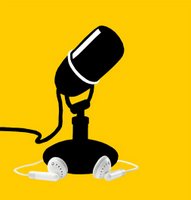 Did you know more people are downloading podcasts now than are actually reading blogs? For all the hype and massive growth of the blogosphere, it's podcasts that are really getting the attention of media trend watchers, including those with new media advertising budgets.
Did you know more people are downloading podcasts now than are actually reading blogs? For all the hype and massive growth of the blogosphere, it's podcasts that are really getting the attention of media trend watchers, including those with new media advertising budgets.
eMarketer.com states that 9 million adults in the U.S. have downloaded podcasts in the past 30 days. Plus another just-under 2 million teens. Nielsen/Netratings from last month estimates that podcasting will attract an audience of 50 million active viewers and listeners by 2010.
Think of it this way: that's more than three New York City or four Los Angeles metropolitan area radio listeners right now. And those radio markets pull in close to one billion in advertising revenue per year.
By comparison, satellite radio has paid-subscriber bases of about 12 million right between Sirius and XM, without much of an adversting model (yet). Imagine if podcast could tap into those revenue models, enhancing and/or pulling from existing radio and televisions marketsand possibly stealing from other "old" Internet ad models like ineffective banner ads and paid sponsored links.
Imagine if podcast could tap into those revenue models, enhancing and/or pulling from existing radio and televisions marketsand possibly stealing from other "old" Internet ad models like ineffective banner ads and paid sponsored links.
That's some big money potential which could roll up in just a few short years. That's why Comedy Central was so eager to start up its Motherload download site podcasting its shows. Why Fox TV shows are available for download through MySapce. Why CBS set up its Innertube. And AOL has In2TV. TV is quickly getting on the Internet. But it is audio podcasting through iTunes that is leading the way.
In response to the explosion in consumer interest (especially since TV broadcasters started making their shows available for download last fall and began online streaming in the spring), more and more companies are jumping into podcasting. And for many good reasons:
1) Podcasting can create a direct communication channel with consumers
2) Unique special content (e.g. test pilots) and new formats can be distributed to measure early adopter and buzz potential
3) Podcasting is starting to generate additional revenue through advertising
4) Custom communication opportunities with customers, partners, investors and employees
5) Allow time-shifted access to educational and other content, meeting On Demand consumer needs
6) Provides an inexpensive, easy opportunity for user-generated content which potentially can build into pass-along viral marketing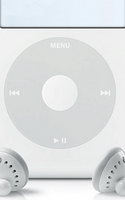 There are many excellent resources online to learn how to build a better podcasting product. To start, understand the built-in challenges of delivering podcasts, including the creation of reliably fresh content. On the tech side, learn the best encoding and producing practices and making sure the podcast product is readable in the most popular media formats.
There are many excellent resources online to learn how to build a better podcasting product. To start, understand the built-in challenges of delivering podcasts, including the creation of reliably fresh content. On the tech side, learn the best encoding and producing practices and making sure the podcast product is readable in the most popular media formats.
Learn the best download distribution points, beginning with iTunes and other popular sites...but also for RSS feed services. Think through quality advertising partners. And, lastly, spend some time understanding how podcast "ratings" are measured so you can exploit your ratings success (for example, is there a difference between a popular podcast download from iTunes and files sharing on peer2peer networks like Limewire or BitTorrent? Can BigChampagne pick up your podcast download measurements?)
Here's one great free podcasting resource for you from Akamai. Happy podcasting!
posted by Unknown @ Tuesday, August 22, 2006,
,
![]()
![]()
When The Levees Broke - A Must Watch To Remember
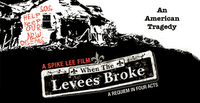 Last night, I watched the first two parts of "When The Levees Broke" -- Spike Lee's documentary film about the impact of last year's Hurricane Katrina. It is powerful, showing the impact on New Orleans and the Gulf Coast after Mother Nature cranked it up to Category 5. The impact it created for the people of that region and how the government's sheer incompetence handled a disaster. The impact of what happens when a democracy has gone astray and forgotten the value of its own people.
Last night, I watched the first two parts of "When The Levees Broke" -- Spike Lee's documentary film about the impact of last year's Hurricane Katrina. It is powerful, showing the impact on New Orleans and the Gulf Coast after Mother Nature cranked it up to Category 5. The impact it created for the people of that region and how the government's sheer incompetence handled a disaster. The impact of what happens when a democracy has gone astray and forgotten the value of its own people.
The impact of what it's like to go back to New Orleans one year later.
With hindsight and time, it makes you ask questions, such as how could the Royal Canadian Mounted Police -- on their horses, no less -- make it to New Orleans to assist and rescue 2 DAYS before the U.S. government?
It's candid. Raw. Real.
And it is a must watch. If ever there was a subject truly deserving the description "water cooler talk" or "reality TV", this is it.
Parts 3 and 4 are tonight. Turn it on and make it part of your everyday conversations. Is anything different today one year later? It's a real life story no one should forget.
Update PostNote 8/23: It's disappointing how little seems to be written in the blogosphere or in the mainstream press about this strong Spike Lee documentary. Come on now, people...this is not just a racial issue, although it sure has a racial story included in it. This is an example of how the taxes Americans pay every year -- which are paid to provide services for the people -- FAILED an entire major U.S. city of major economic importance (hello, the Mississippi/Gulf delta region!) Speak up, people! If you missed the broadcasts on HBO Monday and Tuesday night, the entire 4 hour documentary will run August 26th. Watch...and then talk up the issue in the media in whatever form you choose.
posted by Unknown @ Monday, August 21, 2006,
,
![]()
![]()
What's the difference between Canada and the US? Try This: Radio.
Labels: Radio Canada and the United States share more than any other two countries on this planet. And that goes far beyond sharing the world's largest undefended border crossing. So much sharing takes place, Americans often have a hard time seeing any differences with Canadians. In fact, things are so peaceful with Canada that most Americans hardly spend much time thinking about Canada at all.
Canada and the United States share more than any other two countries on this planet. And that goes far beyond sharing the world's largest undefended border crossing. So much sharing takes place, Americans often have a hard time seeing any differences with Canadians. In fact, things are so peaceful with Canada that most Americans hardly spend much time thinking about Canada at all.
During a time with so much global upheaval, war on terror and violence, the fact Americans are mainly blissfully ignorant of Canada is a strangely wonderful achievement.
Americans simply don't get much news at all about Canada unless it comes from a friend returning from a fabulous vacation or a Canuck celebrity makes headlines (Mike Myers standing shocked next to a "Bush doesn't like black people" Kanye West post-Katrina may have been the last mainstream news Americans heard about something involving a Canadian.) (Or maybe Pam Anderson's marriage to Kid Rock in Saint-Tropez...well, that was probably more about her wedding bikini than her being Canadian).
(Or maybe Pam Anderson's marriage to Kid Rock in Saint-Tropez...well, that was probably more about her wedding bikini than her being Canadian).
Of course, there are differences when the two countries are compared. And, yes, even some news that media trend watchers in America should know.
For example, Radio.
While radio languishes in the old media doldrums here in the U.S, it is doing just quite fine in Canada, reports the Toronto Globe and Mail. While high tech and new media gets a lot of attention in Canada just like in America, Canada's radio industry is quietly thriving and generating strong profits. And American investment firms are taking notice, learning what they can to figure out why radio in Canada is performing so much better than radio in the U.S.
Sales of radio ad spots were up 8.7 percent last year -- its biggest jump since 1988, according to Statistics Canada.
The increase pushed commercial revenue to a combined $1.3 billion for AM and FM stations, led by the top three markets in the country: oil rich Calgary, federal government centerpiece Ottawa-Gatineau and Toronto, the largest market in the country.
Granted, the size of overall economies is substantially different (the U.S. radio ad market is about $22 billion right now; Los Angeles alone pulls in a bit more than 1 billion a year). However, Canada's lean and mean operators are growing revenues faster than the U.S. top dogs right now, keeping the terrestrial radio industry in a much stronger position against competitive medias. In the U.S., the post-consolidation hangover has been continuing for at least 4 years (the post-iPod years), bruising radio's image against everything new tech media.
In America, a common perception by many thinks radio has gotten old, slow and corporate, run by monolithic conglomerates led by suits. Yes, radio is still a dominant media, where an estimated 93% of the population listens at some point weekly for an average of a few hours per day, mostly in commutable bits and pieces. And radio is still essential for American life. Just not as vital everyday as it used to be. In Canada, radio has the same reach into the population every week (94%)...but Canadians listen longer. Canadians are actually more high-tech than average Americans, embracing broadband, satellite and wireless technologies far ahead of U.S. investments. And yet, radio has not rolled over and stayed dead. Canadian radio adapted and made faster digital convergences, getting onto various new media platforms and investing aggressively in web development and live streaming of their on-air broadcasts (something the U.S. still has been slow to transition for music formats due to licensing issues).
In Canada, radio has the same reach into the population every week (94%)...but Canadians listen longer. Canadians are actually more high-tech than average Americans, embracing broadband, satellite and wireless technologies far ahead of U.S. investments. And yet, radio has not rolled over and stayed dead. Canadian radio adapted and made faster digital convergences, getting onto various new media platforms and investing aggressively in web development and live streaming of their on-air broadcasts (something the U.S. still has been slow to transition for music formats due to licensing issues).
Canadian radio stations have gone through a smaller, more careful era of consolidation. One of Canada's top 3 radio groups is still a private (not public) company (Standard Broadcasting). None of America's top 10 radio groups are private. In reality, there is probably a similar ratio of corporate/mom-and-pop radio owners in both Canada and the US. But there is a much smaller gap between the "haves" and the have nots". The industry has done more to protect its interests, both by choice as well as by CRTC regulation.
The most important factor for Canada's current profitable spurt is its adaptation filling the void left behind by TV. The ad revenue surge is driven by a shift among TV networks toward more regional and national ads, leaving local businesses, such as restaurants and shopping malls, to radio. And radio has done a lot to better serve those local businesses. When the television industry essentially walked away from the local ad market, radio was right there to pick up the opportunity. There are some good lessons to be learned by US radio executives and managers...if they just remembered there's a friendly country north of the border. They'd see there's a working model for modern radio partnering and competing well with new media.
There are some good lessons to be learned by US radio executives and managers...if they just remembered there's a friendly country north of the border. They'd see there's a working model for modern radio partnering and competing well with new media.
They'd might enjoy a great beer, too.
Links for Canadian streaming radio stations here
posted by Unknown @ Tuesday, August 15, 2006,
,
![]()
![]()
Does Syndicated Radio Work? It's "Local" Radio, too, as Opie and Anthony slam Tribune article
Labels: Radio Last post, the Jointblog asked what was the #1 morning radio news/talk program in America. The answer was not a "local" station from just one market; it was the syndicated broadcast of National Public Radio's Morning Edition. Every week, 26 million listen to NPR, about 22 million of them listening to the morning show. That's huge reach.
Last post, the Jointblog asked what was the #1 morning radio news/talk program in America. The answer was not a "local" station from just one market; it was the syndicated broadcast of National Public Radio's Morning Edition. Every week, 26 million listen to NPR, about 22 million of them listening to the morning show. That's huge reach.
During Howard Stern's prime on traditional radio before moving to outer space/satellite, he was broadcast on 45 stations and attracted an estimated 23 million fans to his show every week at his peek.
If NPR or Stern broadcast either of their shows in just one market (say, New York City) instead of nationally-syndicating it, neither show would be better nor worse in terms of its content. But one thing is certain: both shows would have substantially smaller audiences. Closing out their own syndicated radio show this morning, New York City-based Opie and Anthony slammed a Chicago Tribune article by media writer Phil Rosenthal, who says "Local airwaves are losing identity to syndication." And rightly so...for both Phil to comment but also for O&A to slam him for his viewpoint. What actually defines "local radio"? Is it entertainment enjoyed locally, regardless from where it is broadcast? Or is it only local if the content includes local reference points, such as memories of popular events and mentions of the current local news, weather and traffic?
Closing out their own syndicated radio show this morning, New York City-based Opie and Anthony slammed a Chicago Tribune article by media writer Phil Rosenthal, who says "Local airwaves are losing identity to syndication." And rightly so...for both Phil to comment but also for O&A to slam him for his viewpoint. What actually defines "local radio"? Is it entertainment enjoyed locally, regardless from where it is broadcast? Or is it only local if the content includes local reference points, such as memories of popular events and mentions of the current local news, weather and traffic?
Or can it be both?
Today, in this increasingly portable and digitized On Demand media world, "local" is whatever you have right in front of you in your control. Your iPod, PSP, DVD, radio, cellphone video, YouTube user-generated viral video...whatever it is, THAT is local. Local is not just about content, it is also about location...Your location in relation to the device connecting you to media.
Strong content is strong content...it's all we care about and all that matters. That's the bottom line....for both consumers and content distributers, local or not.
In reality, "local" means "customized" for today's media. Consumers make the choice what they consume. And they have an overwhelming amount of choice...consumed when they want it, where they want, how they want it. In Rosenthal's article, he says "There was a time when piping in a drive-time show from New York was unthinkable in Chicago." Yes, that's true...when media was a push-system by the media owner/platform owners...not the pull-system from the consumers today. He continues to say local-based shows "provide something live you can't necessarily get off your iPod or from satellite pay radio." Yes, that's true. It's called different content.
In Rosenthal's article, he says "There was a time when piping in a drive-time show from New York was unthinkable in Chicago." Yes, that's true...when media was a push-system by the media owner/platform owners...not the pull-system from the consumers today. He continues to say local-based shows "provide something live you can't necessarily get off your iPod or from satellite pay radio." Yes, that's true. It's called different content.
But that doesn't necessarily mean it makes it more local. Or better. Or more successful.
Sure, shows broadcasting from a listener's (or viewer's) same city hold an initial advantage over a show broadcasting from somewhere else. They can be more flexible, more customizable for that's city's special flavor or personality. However, it can also be limited in its potential because it is more confined to that city's geography. National broadcasts create national perspectives and national conversations. They inform "local" listeners what others think around the country. And a nationally-broadcast show can apply its content development resources on a different economic scale. For example, the investment made hiring comic or content writers for just a local show may not get viewed as profitable as if those writers were used for a show broadcast across the country reaching millions of more consumers. Opie and Anthony are right to slam Rosenthal. While his article accurately reflects a nostalgic sentiment, praising that local is best, that local is radio's strongest competitive advantage and that communities need that local voice...Rosenthal's definition of what is truly local needs to evolve. Yes, O&A only have a few million listening to them on their small but building multi-media network combining broadcasts over both CBS Radio airwaves (and some non-CBS stations) as well as their uncensored satellite show on XM Radio. But local is still local: a show broadcasting to one listener at a time, entertaining and informing them...and maybe getting a chuckle or two.
Opie and Anthony are right to slam Rosenthal. While his article accurately reflects a nostalgic sentiment, praising that local is best, that local is radio's strongest competitive advantage and that communities need that local voice...Rosenthal's definition of what is truly local needs to evolve. Yes, O&A only have a few million listening to them on their small but building multi-media network combining broadcasts over both CBS Radio airwaves (and some non-CBS stations) as well as their uncensored satellite show on XM Radio. But local is still local: a show broadcasting to one listener at a time, entertaining and informing them...and maybe getting a chuckle or two.
Local is right what is front of you and what you decide to turn on or off. Media outlets don't define local media, we all do, through the media content we want, regardless of where it is broadcast.
In Related O& A news: One way Opie and Anthony are getting local is their 1st comedy Travelling Virus tour, featuring many regular comedians that stop by to visit their show. The tour is already setting box office records. All.Access.com reports "New Jersey's PNC Bank Arts Center announced today that the O&A show scheduled later this month is officially the best selling comedy show in the 39 year history of the venue. Total sales for the event now stand at over 10,000 tickets, edging out a previous record set by cutting edge comedian Jay Leno."
Now that's getting local.
posted by Unknown @ Monday, August 14, 2006,
,
![]()
![]()
National Public Radio: Airwaves for the people make a great American success story
Labels: Radio Quick: what's the leading morning radio news program in the United States?
Quick: what's the leading morning radio news program in the United States?
At first, you might think your favorite local All News commercial station. WINS-AM, WCBS-AM in New York; WBBM-AM, WGN-AM in Chicago; KFI-AM, KABC-AM in Los Angeles; KGO-AM in San Francisco all quickly come to mind. Each of these stations have a million or two regular listeners during the week. However, all of those stations pale in audience reach compared to America's radio network: NPR.
And America's #1 morning radio news program?
Morning Edition. You know it. You've probably listened to it. And you may even have its coffee mug after making a contribution. Fox News may bombastically push its patriotism in your face. And the Colbert Report may sarcastically flagwave with mock satire right back at Fox exposing their idiocy with a smile and the proud "chaw" sound of an American bald eagle behind him in support.
You know it. You've probably listened to it. And you may even have its coffee mug after making a contribution. Fox News may bombastically push its patriotism in your face. And the Colbert Report may sarcastically flagwave with mock satire right back at Fox exposing their idiocy with a smile and the proud "chaw" sound of an American bald eagle behind him in support.
But it's NPR that really gets liberty right.
Informative and real. Open. Unbiased. Fair...without fear tactics. And without commercials. What's not to love?
It's the one dependable media space for "middle America" -- where moderates and centrists gather with tremendous loyalty.
For most of its existence, National Public Radio has been one of media's quietest success stories. For all the crazy excitement about new technologies for radio -- internet streaming, cellphone streaming, satellite, HD Radio -- NPR has just kept on doing what it does best: inform and educate the American public with topics and news that helps its listeners understand the world a little better.
Since NPR's founding in 1970, it has become a dominant intellectual and entertainment force in American life and a primary source of news for millions. NPR programming is heard on more than 800 independent public radio stations. It's not commercial -- it's funded by taxpayers and individual donations. In the crassness of this commercial radio age -- with every possible part of programming squeezed for optimal revenues to please Wall Street, NPR sounds like (and often is) a charming oasis of basic Americana minus all the hype. And yet, because it is ignored by commercial ratings services (Arbitron) and it doesn't have the marketing budgets of the commercial broadcasters, most whom think of radio categorize NPR as a separate media, even though it shares space on the same radio dial as commercial radio.
And yet, because it is ignored by commercial ratings services (Arbitron) and it doesn't have the marketing budgets of the commercial broadcasters, most whom think of radio categorize NPR as a separate media, even though it shares space on the same radio dial as commercial radio.
Get this: the audience for NPR programming has doubled in the last ten years to 26 million weekly listeners. Since Fall 2000, the audience to NPR programming has added nearly 8 million listeners, an increase of 40 percent. In the early 1980s, only about about 2 million people listened to NPR.
That's huge growth...all under the radar. More and more in the last decade with Joint Communications research, we have seen NPR stations play an important role for understanding competitive market dynamics and audience sharing. Often, some formats (such as Modern Rock, Triple A and Oldies) have a high level of audience sharing with the local NPR station.
According to a new study from The Media Audit and IPSOS -- which did a telephone survey with 114,035 adults across 84 cities in 2005 and early 2006, National Public Radio is the 4th most listened to radio format in the country.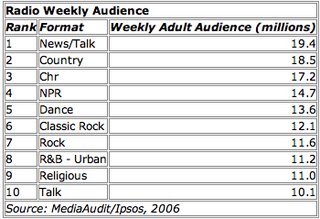 The big difference: NPR is a national network truly broadcasting its format across the nation (as well as the world through new media partnerships and internet streaming). The leading commercial formats -- led by News/Talk -- broadcast their formats individually, unique to each market.
The big difference: NPR is a national network truly broadcasting its format across the nation (as well as the world through new media partnerships and internet streaming). The leading commercial formats -- led by News/Talk -- broadcast their formats individually, unique to each market.
While NPR is not a big factor in terms competing for advertising dollars, it is a major factor in some markets for gathering large audiences completely unavailable to commercial radio. It's a reminder for commercial radio programmers to know their entire competitive landscape.
Don't be surprised if NPR suddenly pops on your radar. As a media trend, NPR airwaves to the people have made a great American success story.
posted by Unknown @ Thursday, August 10, 2006,
,
![]()
![]()
AOL Disconnect: News of Posted User Data Gaff Spreads Throughout the Web
 Brand mistakes happen now and then...and AOL just made a big one. Talk about a customer disconnect...it seems when AOL talks about its "open garden" of custom content, they think that might include posting member search inquiry data.
Brand mistakes happen now and then...and AOL just made a big one. Talk about a customer disconnect...it seems when AOL talks about its "open garden" of custom content, they think that might include posting member search inquiry data.
After news that AOL plans to cut 5,000 jobs (which is one-quarter of their 19,000 person workforce) just as they are making aggressive changes from their subscription model to a mainly broadband and advertising model (which has contributed to revenue, share price and profit gains this year despite the loss of subscriber dollars), the really weird news come in. News that has the strong potential to damage brand name value because it hurts customer trust in privacy and info security. For some reason, someone at AOL Research thought it was a good idea 10 days ago (which is just now being found out) to publicly post all search inquiries of around 658,000 AOL users from March to May (20 million search inquiries) right on view for everyone to view. While the data was supposedly "anonymized", meaning that AOL replaced user names with numbers in an effort to make members unidentifiable, it didn't always work, even if the data was only posted for a few hours (as reported by Wired) because the data made it onto the peer2peer file sharing networks.
For some reason, someone at AOL Research thought it was a good idea 10 days ago (which is just now being found out) to publicly post all search inquiries of around 658,000 AOL users from March to May (20 million search inquiries) right on view for everyone to view. While the data was supposedly "anonymized", meaning that AOL replaced user names with numbers in an effort to make members unidentifiable, it didn't always work, even if the data was only posted for a few hours (as reported by Wired) because the data made it onto the peer2peer file sharing networks.
This gaff was discovered over the weekend and has spread across the Web like a tsuanmi, flooding message boards and blogs. This is serious damage control time for AOL. If they don't address this one quickly, this black eye could create permanent damage. And I am a longtime AOL member.
MediaPost's Wendy Davis gave the following stunned commentary questioning AOL's sanity, which will make you re-think your online habits. It should get you wondering just who is keeping track of you online and what are they doing with your info:"Just as AOL is trying to entice Web users with free e-mail, storage and other formerly paid services, the company committed a gaffe so stunningly stupid, it's hard to believe that consumers will ever trust the company again.
Suggestion: Notify AOL's general comment desk or contact Time Warner corporate headquarters and make your opinion known.
Never mind that users conduct vanity searches for their own names, or addresses, or type their credit card and social security numbers into search engines. AOL maintains that anyone could have typed in that information, not necessarily the person with that name and/or address, social security number, etc.
Well, yes, that's technically true. Users might search for their friends, employers or potential dates. Without more context, it's difficult to glean much from the fact that User X typed in one person's name to a search engine.
But individual searches weren't released in a vacuum; AOL provided three months' worth of context. Anyone who goes over the data released by AOL -- and, even though the company tried to take it down Sunday night, it's been copied and posted throughout the Web--can probably deduce certain information leading to the identities of at least some users.
Of course, people conduct more than simple vanity searches online. They search for drugs, pornography, and all manner of illicit endeavors. One now-infamous user searched on phrases like "how to kill a wife," and "car crashes." Yes, he could be researching a book; the searches alone don't prove anything -- but clearly the revelation of users' searches has the potential to at least embarrass people.
AOL spokesman Andrew Weinstein has been busy apologizing profusely for the incident. He's been sending around statements admitting to the blunder. "This was a screw-up, and we're angry and upset about it ... Although there was no personally-identifiable data linked to these accounts, we're absolutely not defending this. It was a mistake, and we apologize," he stated.
Still, it's obviously too late to fix this mess, at least for the users whose searches were revealed."
posted by Unknown @ Tuesday, August 08, 2006,
,
![]()
![]()
Viacom Eyeing BeBo To Take On MySpace? One to watch...
 As posted here on the Jointblog in March, Viacom/MTVN wants their own MySpace-type social website...like yesterday. The Financial Times reports that MTV parent Viacom is considering a bid for social networking site Bebo.
As posted here on the Jointblog in March, Viacom/MTVN wants their own MySpace-type social website...like yesterday. The Financial Times reports that MTV parent Viacom is considering a bid for social networking site Bebo.
This, of course, would mark the company's latest attempt to nip at the heels of Rupert Murdoch and News Corp., which beat out Sumner Redstone and company last year in a bidding war for MySpace parent Intermix for $580 million, back when it only had 20 million users. Some viewed it as folly and a pursuit of a faddish novelty but it sure has turned into a prescient purchase since MySpace's membership has more than doubled to 40 million users+.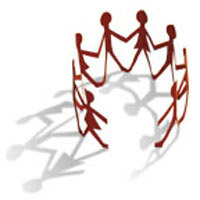 Viacom's interest in the young social network comes a day after the media conglomerate announced a ground-breaking deal with Google to syndicate its content across its AdSense publisher network of niche Web sites and blogs.
Viacom's interest in the young social network comes a day after the media conglomerate announced a ground-breaking deal with Google to syndicate its content across its AdSense publisher network of niche Web sites and blogs.
And there is logic in bringing a successful Euro brand for American expansion instead of trying to rehabilitate a dying US brand (like Friendster) or re-brand an alternative (but smaller) success like Facebook. BeBo is fresh, it already has a success track record and it offers a point of difference from MySpace in style and membership base. And BeBo already is partnered with free online phone VoIP Skype...creating a potentially lucrative partnership between Viacom/MTVN and Skype-owner eBay.
And BeBo already is partnered with free online phone VoIP Skype...creating a potentially lucrative partnership between Viacom/MTVN and Skype-owner eBay.
The success of that acquisition has prompted Viacom and other major media rivals to reexamine the value of sites that command so much of a young user's Web time. MTVN has dugg into gaming social sites (Xfire) and already has Neopets.com but it still hasn't found a comparitive MySpace platform. BeBo just might be it.
Bebo has 25 million registered users worldwide, compared with more than 90 million for MySpace. But it corners the social-network market in Ireland and the UK. Plans for a possible acquisition are at a very early stage, the Times reports, but Viacom is understood to have told its mergers and acquisitions team to look at the company. Of course, the talk of a deal may fall apart.
Bebo says it's in no big hurry to sell but has reportedly held recent talks with UK-based media companies like BT and ITV, from which valuations north of $600 million were discussed. Will Viacom let this one slip through Tom Freston's fingers and how will Wall Street react if it does or decides to grab it?
Media trend watchers would love to see a Viacom/News Corp battle of social networking sites. It's a story we'll follow...meanwhile, I'll just spend a little time getting to know the euro babes' BeBo profiles...
FT.com link here
posted by Unknown @ Tuesday, August 08, 2006,
,
![]()
![]()
Careful, buddy...you just might be put "On Notice" by Stephen Colbert
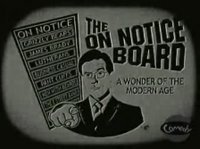 Considering the power and influence of Stephen Colbert (after all, he is one of Time magazine's Top 100 Most Influential), you might want to know how NOT to be "On Notice"... Colbert's list of the naughty he's keeping tabs on (Fox "no spinning" spinmeister Bill O'Reilly silently nods in approval).
Considering the power and influence of Stephen Colbert (after all, he is one of Time magazine's Top 100 Most Influential), you might want to know how NOT to be "On Notice"... Colbert's list of the naughty he's keeping tabs on (Fox "no spinning" spinmeister Bill O'Reilly silently nods in approval).
Colbert's rules? A person (or other) must answer their "summons" within 60 days, or risk being placed on the "Dead to Me" board for eternity. U.S. News and World News publisher Mort Zuckerman, Lutherans, pant cuffs and grizzly bears are just a few to feel Colbert's truthiness wrath.
Fortunately for Mort, he answered the call quickly and no longer is "On Notice" (suddenly, O'Reilly frowns).
Last week, Colbert carefully explained how one gets "On Notice" with this helpful tutorial...
Actual YouTube link here
posted by Unknown @ Monday, August 07, 2006,
,
![]()
![]()
Maybe the RIAA can just ban Saturdays
 While it continues to be the world's biggest peer2peer file trading source, BitTorrent is still trying to figure out a money-making business model while keeping within the compliance of digital copyright cops.
While it continues to be the world's biggest peer2peer file trading source, BitTorrent is still trying to figure out a money-making business model while keeping within the compliance of digital copyright cops.
In the meantime, downloaders keep ripping.
According to research firm BigChampagne, the software is more popular as a file-sharing tool than Napster in its heyday. In fact, it's almost as big as MySpace, with 70 million worldwide users--and can take up as much as 30 percent to 40 percent of the world's Internet traffic, according to bandwidth-measurement firm CacheLogic.
Staying on top of the download buzz, Yahoo! knows what you're up to over the weekend. Despite pleas from music retailers and the RIAA, you're busy stocking up your digital library with free music. Especially on Saturdays. Speaking of which, the recording industry found a new foil this weekend when it announced it would be suing file-sharing software company LimeWire. Already one of Yahoo's top search terms, queries on the file swapper soared.
But the rise in LimeWire buzz wasn't the result of possible legal battles. Interest in the software has everything to do with the day of the week, because when Yahoo Buzz examined the data on LimeWire, they found an interesting graph documenting exactly when downloading heats up (graphic above).
Every spike on the graph above corresponds with a Saturday, the favorite day of the week for music pirates. Like clockwork, searches on LimeWire recede with the start of the work week only to pick back up again each and every Saturday.
I guess Saturday must be music day..cleansing us from all those dysfuntional viral video YouTube viewings we got emailed while at work.
posted by Unknown @ Monday, August 07, 2006,
,
![]()
![]()
Merriam-Webster Adds New Verb: To Google
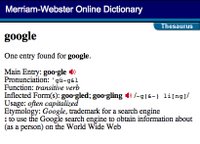 Something that has been used as common vernacular among online users for most of the nils now is using the word "google" as a verb replacement for "search". Its dominance as the first-choice search engine makes it easier to say "did you google it?" instead "did you go online and enter (fill in the blank) in a search engine portal to see if you could find out more information on (fill in the blank).
Something that has been used as common vernacular among online users for most of the nils now is using the word "google" as a verb replacement for "search". Its dominance as the first-choice search engine makes it easier to say "did you google it?" instead "did you go online and enter (fill in the blank) in a search engine portal to see if you could find out more information on (fill in the blank).
Well, I missed this announcement last month and just spotted it now...
Apparently, it's official: Google has become such an essential part of modern speech that it's now in the Merriam Webster dictionary, after the Oxford dictionary added it in June.
The next next hardbound dictionary edition will include "google" as a transitive verb, meaning "to use the Google search engine to obtain information . . . on the World Wide Web."
The listing puts Google in the select realm of trademark companies and products that altered the English language, such as Xerox and Kleenex. Google's reaction? They think it's "appropriate."
Hmmm, as an interesting note, Google's listing on merriamwebster.com is surrounded by, what else?
Ads from Google.
Guess those "Adwords" make "AdSense"...
UPDATE 8/14: Google still isn't liking its name being used as a verb. According to U.K. newspaper The Independent, to google or not to google is now a legal question. They say Google's "sense of humour crashes as it fires off warning letters over use of name as a verb", seeing it as a threat to their copyright protections. Isn't it every marketer's dream...to get their brand completely linked with a product? This is just silly on Google's part...or, perhaps, more clever marketing ploys to keep Google in the public conversation. As if they needed more...
posted by Unknown @ Friday, August 04, 2006,
,
![]()
![]()
Surprise! Whoopi Drops In On O&A To Smack The Pests
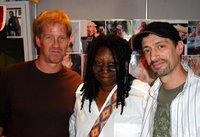 As Opie & Anthony said this morning during their show when they saw her walk into their XM studio, "Whoopi, you've got balls, we're impressed...you just took away a lot of our fun."
As Opie & Anthony said this morning during their show when they saw her walk into their XM studio, "Whoopi, you've got balls, we're impressed...you just took away a lot of our fun."
Comic and new Clear Channel morning show host Whoopi Goldberg dropped in by surprise to visit O&A's after-CBS Radio show on XM to create some peace. Whoopi started her new radio show on Monday and immediately O&A pounced on their fresh celebrity competitor, making fun of her, sending their fan "pests" to flood her phone lines, and even insulting her by calling her a "bitch". She took it all in stride and, like the seasoned comic pro who knows how to verbally spar, said, "Hey, that's okay, because it's true", which made everyone laugh. She even threw in a good jibe at what she called O&A's "who are they, fleas, I mean, pests? Pests, get a life."
She took it all in stride and, like the seasoned comic pro who knows how to verbally spar, said, "Hey, that's okay, because it's true", which made everyone laugh. She even threw in a good jibe at what she called O&A's "who are they, fleas, I mean, pests? Pests, get a life."
In the end, O&A agreed they have completely different audiences, with Whoopi saying she "loves you guys, just give me the women listeners." And everybody made nice.
For every confrontation O&A love to start, Whoopi did the exact right thing: give them the attention they want before it got out of control, stand up to them, and create some laughs over the whole situation. Nips it in the bud and everyone can move on. Good PR move for both Whoopi and O&A...stirred up a little controversy and newspaper/blog gossip...and create some entertaining radio. Her fans will love the fact she stood her ground.
And, Whoopi showed her radio smarts, recognizing the asses they are, recommending they all get their prostate's checked...seriously. So, in addition to getting to cross-promo her show and increase her radio cred, she also slipped in some support for one of her personal charity causes.
Now, the question is: will the O&A pests get off her ass now that peace has been brokered?
And, can this model work in the Middle East, too? To hear the full broadcast this morning from FoundryMusic.com, click here.
To hear the full broadcast this morning from FoundryMusic.com, click here.
Opie and Anthony poll questions here
Opie and Anthony fan site for downloads at FoundryMusic.com
Station info on Opie and Anthony broadcasts on CBS Radio here
Station info on Whoopi radio broadcasts here
posted by Unknown @ Thursday, August 03, 2006,
,
![]()
![]()















